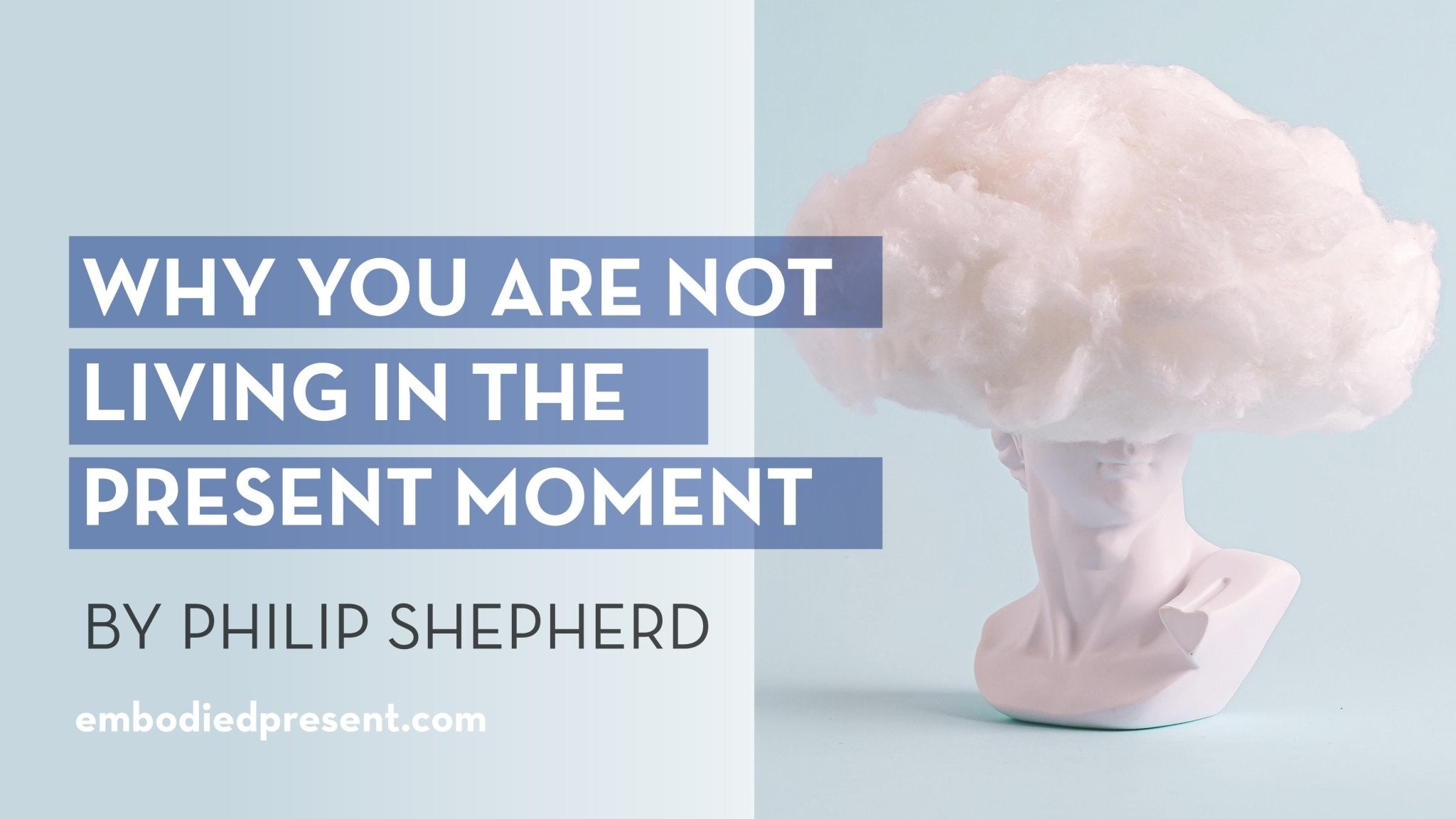After I made the video above, I thought some more about it, and put pen to paper, and wrote this slightly longer exploration of the subject. I feel the video and the little essay are complementary, and I hope you feel the same way. Here's what I wrote:
Have you ever wondered why you are not living in the present? For me, the crux of the matter lies in the fact that what we experience as our intelligence is actually a dance or marriage between two primary intelligences that live in each of us. Those intelligences process information very differently, and I believe the main source of those differences lies in the divergent characteristics of the right and left hemispheres of the brain.[1] How those differences show up for us personally, though, is most clearly felt in how we experience the intelligence of the head versus that of the body. Once we appreciate the nature of each, the contrast reveals a wonderful complementarity.
What we experience as the intelligence of the head seeks to represent the world within a closed system of ideas. That is, it constructs a model of the world, which it organizes and supplements. It can demonstrate a superlative proficiency at logic and conscious reasoning, and it specializes in discerning or creating systems that are capable of phenomenal insights. In fact, that capability is so potent that it can flatter itself with a sense of being all-powerful, oblivious to the limited scope of its achievements.
One example of its limitations shows up precisely around the issue of being present. If you try to reason your way into the present, it’s likely to feel like wandering a hall of mirrors in search of an exit. That wandering is actually built into the nature of the head’s intelligence. The main resource it depends on is its constructed models of the world – its ideas – which pull it out of the present. And those ideas are a product of the head's reliance on abstraction. In its essence, abstraction is a process that eliminates or diminishes context in order to isolate phenomena, gain perspectives on them, and place them within a system of understanding. That is a very useful ability and is the primary strength of the head’s intelligence; but the ultimate context – the ultimate reality – is the present. By diminishing context, the head’s intelligence inevitably distances itself from the present, and so runs the risk of becoming trapped in its own constructs.
However heroically you apply yourself, you will never understand the present in any objective way. It can only be felt. But the head does not feel, it only wants to understand. And the systems it builds to achieve its understanding depend on ideas, which are static. And here we disclose a fundamental misalignment with reality, because the world those ideas seek to represent isn’t static. Nothing is. A slab of granite may change more slowly than a leaf on a tree, but both are always transforming. Everything is a process that is part of the larger process of the whole. The intelligence of the head sees only parts, not the whole, and the way in which it habitually dismisses context leads to the illusion that its relationships with the world are primarily subject/object, or ‘me’ and ‘it’ relationships.
In reality, no object is completely separate from any other – so there can be no such thing as an objective relationship, in which you can stand apart from the world and make observations about it without affecting it and being affected in turn. Quantum mechanics has amply demonstrated that we live in a participatory universe from which nothing can excuse itself. But the head believes in an objective reality – one that its systems can represent, and from which the intelligence it possesses can stand apart. When an intelligence is so fundamentally mistaken about the nature of the present, it fundamentally disables itself from being able to join it.
By contrast what we experience as the body's intelligence is sensational. It understands by feeling; what it most deeply feels is the present; and its capacity to feel has no discernable limit. Indigenous cultures demonstrate this over and over: they can feel animals moving through the world around them; they can feel the presence of water; they can feel plants offering medicines; and occasionally they can feel each other’s thoughts. Western culture, too, has lots of examples in which our intelligence is attuned by the body’s thinking. Shakespeare's language, for example, is deeply embodied – informed by the body's rhythms and felt relationships with the world. Beethoven’s symphonies derive their life from the body's intelligence, and when we listen it is our bodies that recognize and respond to that life. The body's intelligence is able to attune to the world with an unimaginable sensitivity, processing over a billion times more information than we can be consciously aware of.
In short, then, the head’s intelligence operates as though it were separate from the present; the body’s intelligence is activated by the present. This provides a complementarity that has always been part of human nature; we've relied on the dance between these intelligences for our very survival. But our strange, modern culture only honours the intelligence of the head; it dismisses the intelligence of the body. In fact, it defines intelligence as the ability to reason in an abstract fashion – a narrow definition that identifies true intelligence with the head and treats the sensational present as a source of distraction, potentially interfering with the head’s ability to think clearly. By giving our allegiance to that part of our intelligence, we frustrate our ability to live in the present.
This imbalance between our intelligences permeates our entire culture. We exalt the head, considering it to be the rightful ruler of the self, and deem the body to be a functional apparatus for moving the head from place to place. The allegiance we've given to the head shows up in our language, in our architecture, in our customs, and in all our relationships. And so it is that we say “Two heads are better than one”, rather than, for example, “Two hearts are better than one”. In our culture the leader of every organization is known as the “head” of that organization, because we live with the deep assumption that the head should always be in charge. We assert the same view when we speak of a Chief Executive Officer, for the word “chief” comes from a Latin word that means head. Similarly the word “captain” derives from a word for head. The economic system under which we live, capitalism, literally means “headism” – and true to its name it's a system that is designed to gratify the values of the head. The theme plays out over and over. When we do a head count, we are determining how many people are present; when we do a body count we are determining how many people are dead.
The reason you aren't living in the present, then, is because you've been trained since infancy to neglect the sensational intelligence of the body and live in the head. If you are living in the head, you are living in a model of the present, a duplicate constructed of ideas, not in the present itself. The question, then, is how to bring the intelligence of the head home that it might merge with the body’s wakefulness to the mindful present. The challenge of doing so shouldn't be underestimated: we've been deeply, relentlessly taught to mistrust the body and to rule ourselves from the head.
To begin to counteract that training, then, here's a little question you might play with. Can you feel the body in its wholeness – just that – without striving, without organizing it, without any expectation of how it should feel or what you should notice? Can you drop into its life and let that life carry you? In my experience, if you give that a try, it will eventually carry you into the present, for the present lives within you at every moment. Intimately. You are inseparable from it in any way. The reason you aren’t living in the present, when all is said and done, is because you don’t feel the present living in you. Ultimately, the body in its wholeness is the medium through which the present is revealed in its wholeness. Feel the present living in and through you, and you'll also feel yourself living in the present. Or at least, that’s what experience has shown me.
[1] Those differences are elucidated by the formidable Iain McGilchrist. His latest book, The Matter with Things, is the most brilliant book I’ve ever read.
Photo by Adrian Swancar on Unsplash






1 comment
Excellent. Thank you. A rich resource. In Tango, it is often stated that the difference between the lead and the follow is that the lead thinks into acting and the follow intuits action. THis is an unfortunate representation as both the lead and follow act from their bodily knowing in response to the music and mutual movement.
Leave a comment